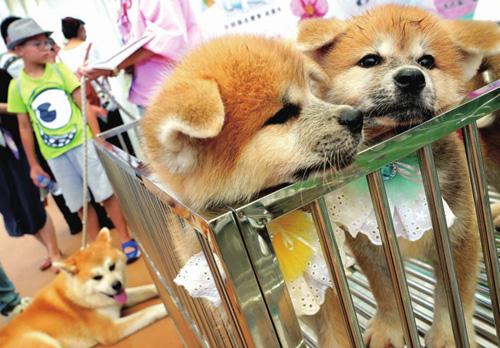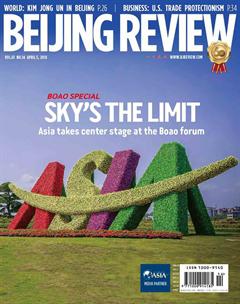Part of the Family
By Xia Yuanyuan
Zheng Yu is in love with cats. Her childhood dream to own one was finally realized last year when she started working and got her own apartment. However, over the course of several months, Zhengs assumptions on keeping a cat have completely changed. She never knew that domesticated cats had spawned an entire industry with a range of products and services that beggars belief. Toys, nail clippers, fur care powder, pooper scoopers, hygiene products and furniture are but a few. “Its totally beyond my imagination,”she told Beijing Review.
Zheng is part of a growing legion of pet owners across China fueling an unprecedented boom in this industry. According to a white paper jointly published in 2017 by the Chinese Pet Products Association and other organizations, 134 billion yuan ($21.3 billion) was spent on Chinas pet industry in 2017, up 30.9 percent year on year. The figure is expected to rise to 200 billion yuan ($31.8 billion) by 2020.
Emotional comfort
Chen Xufeng owns the Xiaowo Pet Shop in Beijing, which sells a variety of pets including cats, dogs, rabbits, goldfish, turtles and even snakes and lizards, along with pet supplies. He told Beijing Review that his customers range from children to seniors. “In big cities, owners always treat their pets as family members. Pets bring companionship,” he noted.
Wang Zhiyu, a 29-year-old editor, agrees with Chen. “My cat Jiumi makes me feel less lonely since I am living in Beijing alone. She is like part of the family,” she said. For seniors, pets make up for the gap left by children who work far from home. They can channel their affection into caring for their four-legged friends, while also generously spending money on their food, health and daily necessities.
Although people have different reasons for keeping pets, most are seeking emotional comfort. China has one of the worlds lowest birth rates, and a growing number of middleclass couples are choosing to lavish their time and emotion on pets rather than children. In addition, China is home to the worlds fastestgrowing aging population. A total of 480 million people aged 60 and above will account for about 25 percent of the population by 2050, according to the National Bureau of Statistics of China. Their furry friends can offer alternative companionship to the absence of distant children.
A lucrative market
The growing number of pet owners in China is also more willing to splash out on their pets than ever before. And the focus has been wid-ened from just material offerings to veterinary services. As the “mother” of a poodle, Li Fan takes her “son,” Dingding, to the dog parlor for grooming and a health checkup every two months. Each visit costs about 150 yuan ($23.9). Last year, Lis pet bills, including dog food, were around 4,000 yuan ($637). She also paid about 600 yuan ($95.6) to veterinarians for grooming services, including teeth brushing.
In Chens shop, pet owners can find everything from name-brand food and imported medicine to lifestyle-related products like beauty items and pet garments. Services include clinics, photography, skills training and pet hotels.
According to the 2016 White Paper on the Pet Industry in China, published by the Guangzhou-based Yourpet Research Institute, pet owners spent the most on food, health care and health products, with food purchases accounting for 35 percent of the total. On average, dog food sets owners back 6,436 yuan($1,025) per year per dog, which is higher than the 1,689 yuan ($269) for a cat.
Chinese citizens growing pet obsession has now launched a new trend. In an office building located in Beijings Zhongguancun Street is Cappucimeow, a fashionable cat cafe attracting like-minded customers. They sit in groups, sipping cappuccinos and chatting, while seven cats, including a British Shorthair and a Siamese, strut around, rubbing themselves on appreciative legs and enjoying the attention.
“My major reason for coming to the cafe is for the cats. I love cats, but I dont have enough time to keep one. This cafe is a good place to enjoy leisure time with these lovely creatures,” Ni Li told Beijing Review. Compared with traditional cafes, a cat cafe has to spend an additional 10,000 yuan ($1,593) on pet food and other necessities, but they are able to recoup the money in food and beverages sales.
Virtual pets
In addition to live animals, Chinese peoples love for pets has spread online. Some social media accounts, opened in the name of cats or dogs, have a large fan base. For example, Xiaomajia, a user of Weibo, a Chinese Twitter-like microblogging website, posts daily photos of his cat, Duanwu, and dog, Niuniu and boasts more than 29 million followers. With each post, he makes about 20,000 yuan ($3,187) via advertisements.
“I am a fan of Niuniu. Its as if I were keeping a dog myself as I watch the pictures and videos of her every day on Weibo,” said Luo Ziqing.
Chinese affection for pets has also boosted the gaming industry. A recent favorite is the Travel Frog, which is extremely popular among young Chinese. Users keep a frog online and give it a name. From time to time, players tap their phones to check if their pet frog has eaten, slept, gone out to meet friends or traveled. Some players said the game helps them learn about parenthood. “Taking good care of my frog is just like taking good care of my child,”said Yang Meichen, who works in Beijing. “It arouses my maternal love.”

